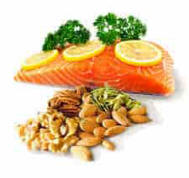CIDPUSA.ORG Autoimmune Diseases
Omega-3 RESEARCH
Summary of the NATO advanced research workshop on dietary omega 3 and omega 6 fatty acids: biological effects and nutritional essentiality.

.jpg)
Division of Nutritional Sciences, International Life Sciences Institute Research Foundation.
A number of human studies presented at the workshop indicate that the premature infant at birth is biochemically deficient in docosahexaenoic acid (DHA) in both the brain and liver phospholipids, and that DHA is essential for normal visual acuity. The amount of DHA necessary to maintain normal amounts of the liver and brain phospholipids postnatally is 11 mg/kg daily.
Elderly patients on long-term gastric tube feedings and others on long-term intravenous fluids and on total parenteral nutrition are particularly prone to deficiencies of alpha-linolenic acid, eicosapentaenoic acid (EPA) and DHA. The amounts estimated to prevent deficiencies in the elderly are 800-1100 mg/d of alpha-linolenic acid and 300-400 mg/d of EPA and DHA combined. Preliminary data indicate that children with malnutrition and mucoviscidosis, women with toxemia, and elderly people have decreased amounts of DHA in plasma phospholipids.
The omega 3 fatty acids lower triglycerides and, at high levels, lower cholesterol. The anti-aggregatory, anti-thrombotic and anti-inflammatory properties of omega 3 fatty acids have been confirmed, and a dose-response curve is emerging. Despite the increase in bleeding time, no clinical evidence of bleeding has been noted by the investigators in any of the studies.
Clinical trials are necessary in order to precisely define the dose and mechanisms involved in defining the essentiality of omega 3 fatty acids in growth and development and their beneficial effects in coronary heart disease, hypertension, inflammation, arthritis, psoriasis, other autoimmune disorders, and cancer.
Bourre JM.Benefits of Omega-3
Omega-3 fatty acids are the good-for-you fats that protect your heart by reducing your risk
for cardiovascular disease. Omega-3s also have anti-inflammatory properties that may help fight disease, boost your mind and mood, and reduce symptoms of inflammatory conditions, such as rheumatoid arthritis.
This review details the specific needs of women for omega-3 fatty acids, including alpha linoleic acid (ALA) and the very long chain fatty acids eicosapentaenoic acid (EPA) and docosahexaenoic acid (DHA). Omega-3 fatty acid (dietary or in capsules) ensures that a woman's adipose tissue contains a reserve of these fatty acids for the developing fetus and the breast-fed newborn infant. This ensures the optimal cerebral and cognitive development of the infant. The presence of large quantities of EPA and DHA in the diet slightly lengthens pregnancy, and improves its quality. Human milk contains both ALA and DHA, unlike that of other mammals. Conditions such as diabetes can alter the fatty acid profile of mother's milk, while certain diets, like those of vegetarians, vegans, or even macrobiotic diets, can have the same effect, if they do not include seafood. ALA, DHA and EPA, are important for preventing ischemic cardiovascular disease in women of all ages. Omega-3 fatty acids can help to prevent the development of certain cancers, particularly those of the breast and colon, and possibly of the uterus and the skin, and are likely to reduce the risk of postpartum depression, manic-depressive psychosis, dementias (Alzheimer's disease and others), hypertension, toxemia, diabetes and, to a certain extend, age-related macular degeneration. Omega-3 fatty acids could play a positive role in the prevention of menstrual syndrome and postmenopausal hot flushes. The normal western diet contains little ALA (less than 50% of the RDA). The only adequate sources are rapeseed oil (canola), walnuts and so-called "omega-3" eggs (similar to wild-type or Cretan eggs). The amounts of EPA and DHA in the diet vary greatly from person to person. The only good sources are fish and seafood, together with "omega-3" eggs.
- Clay baths
- Steaming Sand Baths
- Coconut oil Benefits
- Deodorants cancer
- Toxic Lipstick
- Niacin deficiency
- Vitamin -D
- Vitamin-C
- Vitamin-E
- Spiritual illness
- ACV
- Healthy Oils
- Feet Home
- Beauty Tips for Women
- Celiac disease
- Right Fat Diet
- Apple juice
- Vinegar Benefits
- Supplements
- Cupping
- Alzheimers
- CMT neuropathy
WE PROVIDE HELP FOR STYING HEATHY